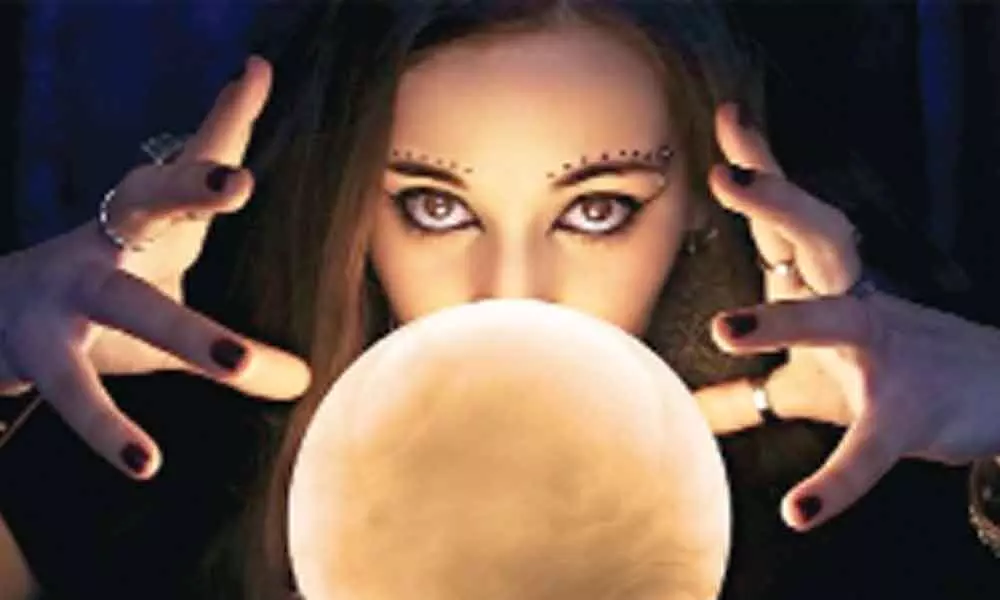It's no fortune telling!

It’s no fortune telling!
Life, horoscope, astrology and the concept of God in Hinduism...
Why does one study Astrology, be it the Western or the Indian?
Is it any easier to understand the subject that is said to be dealing with our lives in conjunction with the planets that influence it one way or the other due to their movement? Why is it important to understand Astrology at all?
Are Karma and Life interlinked? Does Karma explain Astrology or vice versa?
Above all, does Astrology just explain the developments in our life or does it have a solution to the perceived problems too?
Our life is wonderful and yet preposterous. Those who cannot change their actions and the accompanied mala fide intentions can easily attribute the criminality to their Karma. But to understand life in isolation will be a futile exercise. Hinduism and Vedas are to be studied and understood at various levels.
Let us begin with Karma. Karma leads to future consequences, Karma-phala, "fruit of action". Any given action may cause all sorts of results, but the karmic results are only those results which are a consequence of both the moral quality of the action, and of the intention behind the action.
We suffer countless losses, diseases, heartbreaks in life and feel sorry for ourselves. The moral pendulum keeps ticking from good to bad to right and wrong to 'punya to papa'.
What is the first question that comes to your mind? "Why me? What did I do to deserve this?" The answer to this lies in understanding the concept of samskaras.
Every action and thought that crosses our mind leaves an imprint on our destiny, it gets stored in the karmashaya, to be fructified at a later point in this life or future lives. This stored data is called samskaras. These samskaras come to fruition, deciding the course of our life because in attaching emotions to our actions we gain a sense of ownership towards these actions. When our destiny is paired with the data stored in our ethereal hard disk, those stored samskaras fructify in congruence with the rays of the planets.
Having said that, let us halt here for a brief while.
Spiritually evolved people know how to re-balance their karma and negate samskaras through the practice of recitation of advanced mantras and performing a lot of seva, thereby tilting the balance in favour of perceived positivity.
(Dharma refers to one's duty in this life. Your Dharma varies according to your class, your family, and the time of your life. Karma – refers to the actions that one does in relation to one's Dharma. In a sense, Dharma could be seen as one's lifelong task and Karma the steps that one has to take to complete the task).
For the believers, astrology could be the basis to determine the course of our actions. We need to take a referral point - time, to understand the process too. Here comes the horoscope of our life. The development of karma into the fruitions stage and the passage of life (through the time) are synchronous. Hinduism does not separate these two. In fact, according to this way of life, both Karma and Life are interlinked.
From 'Anda', to 'Pinda' to the final 'Brahmanda', birth, growth and death are all within a time span. Irrespective of the timeline, the karmic processes continue to shape the life form and end in death. The cyclical time in itself is endless and irrespective of the births and deaths, it continues. But, when we talk of life, we are talking of individuals and their autobiographies depend on their karmic curve. The very beginning of this synchronicity begins with birth. A Horoscope gives it to the person who is born.
Hence, a horoscope indicates the synchronicity that begins the conjunction of Karma and time travel of a person. A life-time is thus the travel of a person that begins with birth and leading to his or her death.
Astrology distinguishes the events separately operating in time through the Horoscope. The astrology-cycle of 12 months is just a part of the life cycle. Such cycles of 12 months each spread over a period - between life and death - could be understood by reading the Zodiac. As the whole process is cyclical, to understand something that happens at a point of time during one's life, one needs to go back to the beginning of it all - from the month or day it began.
Don't ever mistake astrology as 'fortune-telling'. It is called Vedic Astrology because it is a limb of the Vedas - Vedanga - which is called Jyotisha. The basis for this science is Astronomy dealing with the laws pertaining to planetary motion.
Alan Leo, born William Frederick Allan, was a prominent British astrologer, author, publisher, astrological data collector and theosophist. He is often referred to as "the father of modern astrology". His work stimulated a revival of astrology in the Western world after its decline at the end of the 17th century.
He used to call astrology a "symbolic science of Mystic Kabbalism, which is also the bed-rock of Vedic Ritual or Yagna, Tantra and Yoga-Shastras" of which the Yoga-Shastras gave rise to the predictive Astrology. This is based on the identity of the universe with life. Cosmic Symbolism gives rise to the planetary effects on a person.
'Purusha Medha' gives the theory as the basis of the Vedic ritual of Purusha that is explained in 'Rig Veda' in 'Purusha Sukta' thus:
"Purussa Evedam Sarvam Yad-Bhuutam Yacca Bhavyam |
Uta-Amrtatvasye[a-I]shaano Yad-Annena-Ati-Rohati ||2||
Meaning:
2.1: The Purusha is indeed all this (creation) in essence; That which existed in the past, and that which will exist in the future.
2.2: Everything (i.e the whole creation) is woven by the immortal essence of the Great Lord (Purusha); by becoming food of which (i.e. by getting consumed in whose immortal essence through surrender) one transcends the gross world (and becomes Immortal).
Tri-Paad-Uurdhva Udait-Puurussah Paado-Asye[a-I]ha-Abhavat-Punah |
Tato Vissvang Vya[i-A]kraamat-Saashana-Anashane Abhi ||4||
Meaning:
4.1: The Three parts of the Purusha is high above (in transcendental realm), and His One Part becomes the creation again and again.
4.2: There, in the creation, He pervades all the living (who eats) and the non-living (who does not eat ) beings....
(We may disagree with the other parts of the Suktam in the latter part, but Astrology should be applied to the above said and need not necessarily beyond).
Every ancient magical science had, in its heart, the same universal man - Hebrew Kabbalah and its idea of the 'Universe-Man', Chinese Pan-ku, the Mexican 'Quetzalcoatl', the Egyptian Sources of Measures and the Masonic figures... all of these are the branches of the same Cosmic Symbol.
One may say that Man is a form of star-dust, but it only means that a Man is no different from the universe (s'). Astrology deciphers the changes in the physical form drawing its images from the planetary motion because both have the same DNA, let us say.
And if we agree that Time is relevant to us only as long as we live, we can also say that the whole of Time is in us, i.e., the yearly cycle of 12 months of Rasi Chakras. This Time is not independent of the Universal Time or Cosmic Time. The Rasi Chakras are related to our internal Sushumna Nadi with Six Chakras and these are ruled by the Zodiacal times. Each of these Chakras has two sides - one negative and the other positive.
Similarly, in Astrology, each planet has negative and positive houses or two Rasis. The Moon and Sun rule the night and day or the left and right side (Ida Nadi) and (Pingala Nadi). The six Rasis connected with each semi-circle of the night and the day half, thus rule the bright and dark fortnights (Shukla and Krishna Paksha) of six months each in the year. Thus, the inner Rasi Chakras are part of the Tantric Zodiac and it connects with the outside.
There is a mantra for each planet, its Devata, its syllable (Bija Akshara), its colour, its number, its geometrical shape and also its vibration, sages have explained. Thus, the Mantra Shastra and the Yoga Shastra are interlinked.
Never study any subject in isolation. That is the lesson we must learn. Unless we go to the depths and understand the inner fully, the outer won't be understood. Without understanding and studying the Rasi Chakras or the symbolism of Zodiac, to understand the concept of Hindu Gods and their symbolic meaning will be difficult.
Life, Planet, Universe and the concept of God are thus intrinsic to the science of Astrology. A proper understanding of all these could lead to real "Jnana" of who we are and why?








